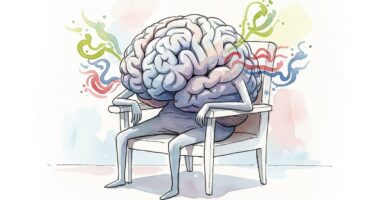Eight in 10 UK students aged 13 to 18 use artificial intelligence tools for schoolwork, yet fewer than half feel confident identifying whether AI-generated content is trustworthy, according to new research from Oxford University Press.
The survey of 2,000 students conducted in August 2025 reveals a concerning gap between AI adoption and digital literacy. Whilst 79 per cent of young people use AI tools in their schoolwork, only 47 per cent believe they can tell what information provided by AI is true. One third stated they cannot identify accurate AI content, whilst a fifth were unsure of their abilities.
Regional variations in confidence levels prove particularly stark. Just 25 per cent of London students expressed uncertainty about identifying AI misinformation, compared to 35 per cent in the South excluding London, 29 per cent in the Midlands, and 31 per cent in the North. London students also demonstrated the highest confidence at 63 per cent, significantly above the national average.
AI usage varies considerably across regions. London students showed the highest adoption at 92 per cent, compared to 73 per cent in the South excluding London, 75 per cent in the Midlands, and 79 per cent in the North. Similar patterns emerged for homework usage, with 91 per cent of London students using AI tools at home versus 76 to 77 per cent elsewhere.
Students expressed significant concerns about AI’s impact on learning. Sixty per cent worried that AI tools encourage copying rather than original work, whilst 51 per cent feared AI resources may contain bias or reinforce untrue stereotypes. Nearly half of young people are concerned their peers secretly use AI inappropriately, with London students most worried at 57 per cent compared to 42 to 45 per cent elsewhere. Forty-seven per cent believe teachers cannot detect this misuse.
Half of students expressed concern about the accuracy of information AI provides, whilst an equal proportion worry the AI resources or tools they use may not be safe. Fewer young people worried about knowing less than their peers, though 30 per cent nationally expressed this concern, rising to 37 per cent in London.
“This research tells us that students are attuned to the effects of AI on classroom and independent learning, and highlights how AI tools, designed with learning principles at their core and grounded in strong pedagogy, are absolutely necessary to enhance teaching and facilitate learning for all,” said Dr Alexandra Tomescu, Generative AI and Machine Learning Product Specialist at Oxford University Press.
Students want greater support from educators. Almost half seek help understanding which AI-generated content is trustworthy, whilst 51 per cent want clearer guidance on appropriate AI use in schoolwork. Additionally, one third believe their teachers lack confidence using AI tools in lessons, with only 61 per cent of London students believing their teachers are confident, compared to 42 per cent in the North, 40 per cent in the Midlands, and 36 per cent in the South excluding London. One in three pupils want their teachers to make more use of AI resources in the classroom.
When asked how they would most like to use AI in schoolwork, students highlighted two primary areas. More than 430 student responses mentioned wanting AI to provide feedback, check their work, highlight mistakes, and offer improvement tips. Another 390-plus responses focused on planning support, including creating revision schedules, flashcards, mock tests, and organising tasks.
“I want it to give me practice questions and help me spot where I’ve gone wrong in my homework,” said one 15-year-old male student. Another 17-year-old female student described wanting “access to new ideas or difficult to find sources of information.”
Despite concerns, over 90 per cent of students acknowledged AI has helped develop skills. Problem-solving ranked highest at 18 per cent, followed by clearer presentation of thoughts and creative thinking at 15 per cent each. Exam preparation at 13 per cent, speed of information processing at 12 per cent, and improving work for better grades at 11 per cent also featured prominently. Technical skills development was noted by seven per cent, whilst just five per cent said AI had not helped develop any skills.
“I have been able to understand maths better and it helps me to solve difficult questions,” said one 15-year-old female student. A 17-year-old male student explained: “It takes what I say/think and puts it in an order which makes it easier for others to understand.” Another 14-year-old male student noted: “I now think faster than I used to.”
However, 60 per cent recognised negative impacts. A quarter said AI makes finding answers too easy without genuine learning, whilst 12 per cent felt it limits creative thinking and 10 per cent found it harder to write creatively. Eight per cent believe they are less likely to understand and solve problems, whilst five per cent feel prevented from learning technical skills. Thirty-one per cent did not believe AI had negatively impacted their skills.
“It provides answers to questions for me very easy without me going to do much research about a specific topic or subject,” said one 13-year-old male student. Another 13-year-old female student stated: “It does not allow me to challenge myself.” A third 13-year-old male student admitted: “Am dependent on it now.”
“It’s encouraging to see from the research how aware young people are of the challenges surrounding AI and how eagerly they want to collaborate with their teachers to address the issues,” said Amie Lawless, Secondary Product Director at Oxford University Press. “Most importantly however, the findings offer a valuable reminder of bringing together trusted content and sound learning design principles with responsible AI tools which put the learner’s needs at the core.”
Dr Erika Galea, Founder and Director of the Educational Neuroscience Hub Europe, noted that today’s students are beginning to think alongside machines, gaining fluency and speed in processing ideas, yet sometimes losing the depth that comes from pausing, questioning, and thinking independently. “The report reminds us that the true challenge ahead is not mastering technology but safeguarding the depth of human thought in an age of synthetic cognition and artificial intelligence,” she said.
The research coincides with Oxford University Press launching its AI and Education Hub, a dedicated resource for teachers featuring regularly updated articles, insights and guidance from experts across the education technology industry.











